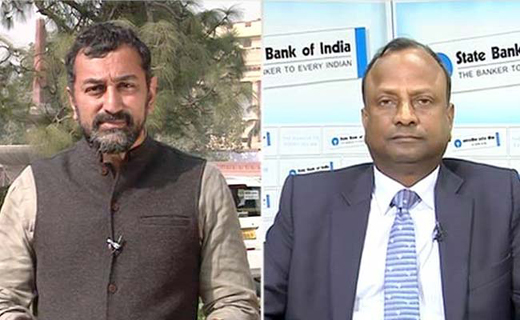Fraud by Banks is Condemnable, But only small fraction of Total Transactions: SBI
Mangalore Today News Network
New Delhi, Dec 13, 2016 : As raids on banks and individuals across the country are throwing up hoards of black cash in new currency notes, questions are being asked if banks are complicit in money laundering.

Talking to NDTV exclusively, Rajnish Kumar, the Managing Director of State Bank of India, India’s largest bank, admits there are instances of fraud, but says it is only a small fraction of the total transactions.
According to tax officials, approximately Rs. 120 crore has been seized until December 6. They have found Rs. 1,500 crore of unaccounted income.
In that same period, he said SBI has handled 31 crore payment transactions, an average of more than a crore daily, distributing a total of Rs. 1.4 lakh crore. Overall, banks have disbursed around Rs. 4.3 lakh crore in this period.
"The one thing to be mentioned is that we have to look everything in proper perspective," said Mr Kumar, adding that "banks are carefully recording how each and every rupee is being dispersed".
Mr Kumar told us that one of the most likely ways for crooked bank officials to perpetuate fraud is through the conversion of banned currency to new notes.
Since there are limits on the amount of cash that can be exchanged, Mr Kumar explained that some dishonest bank employees may be working with the money launderers handing over more cash than what is permitted, thereby flouting the RBI instructions.
These would be any official in charge of the banks currency chests.
However, this fraud, he says, can be easily spotted. "It can be found very easily who has done this, and where it has happened," said Mr Kumar.
Within the SBI network, he says 16 cases of fraud have been detected. "All 16 have resulted in suspension and initiation of inter-departmental action, filing of suspicion transaction report and filing of FIR with police and filing of suspected fraud to RBI," he said.
Courtesy:NDTV
- Mangaluru: Safety supervisor of NH works alleges assault by traffic cop
- Kasargod acid attack: Woman critical after assault by stalker who later dies by suicide
- Mangaluru: Car fatally knocks down woman at Kuthar
- Special prayers in temples seeking divine blessings for Indian defence forces
- Pope Leo XIV: US Cardinal Robert Prevost elected as the new pope
- Rs 116 crore grant for development of Karkala’s Anekere and Varanga Jain Temples
- Suhas Shetty case: MLAs from DK and Udupi to meet Governor on May 9, seek NIA probe
- Security stepped up across the coast of the state
- DK administration inks MoU with NITK to set up civic think tank consortium
- Police Commissioner warns against provocative, threatening social media posts
- Sullia: 1 dies; 2 injured in collision between cars
- Provocative posts: 2 more FIRs filed in Mangaluru
- Kantara Chapter 1 junior artiste drowns in Sowparnika river
- IPL 2025 suspended indefinitely amid escalation in India-Pakistan tensions
- 7 terrorists, backed by Pak rangers, shot dead trying to infiltrate in Jammu
- Karnataka to hold first-ever survey of persons with disabilities
- X says it blocked 8,000 accounts in India after government’s executive orders
- The S-400 defence system used by India to neutralise Pak missiles
- Firing at LoC hours after India foils Pak attack
- 24 airports shut in India amid escalating India-Pakistan tensions | Full list
- Overnight Naval ops in Arabian Sea after Pak tries to attack India: Sources
- India neutralises Pak drones and missiles aimed at 15 cities, destroys Air Defence system
- Film on Operation Sindoor, 15 bollywood studios rush to register title
- Indian Armed Forces target air defence systems in Pakistan as unprovoked firing along LoC increases
- 100 terrorists killed, Rajnath Singh tells all-party meet on op Sindoor
- Skills and Competencies Take Center Stage at MSN Dialogue Series
- Court remands Maoist Lakshmi to six-day police custody
- Sandhya Shenoy honored with Society for Materials Chemistry Medal-2024
- White Cornus Apartment in Mangaluru
- City girl wins first place in state-level spell bee competition
- Alleged ‘Love Jihad’ Case in Mangaluru: Woman left home voluntarily, says police
- Girl fatally struck by reckless two-wheeler near Belman
- New residential complex for the judges inaugurated in Mangaluru
- Absconding accused nabbed after 8 years
- Truck with cylinders turns turtle in Beltangady
- Bhoota Kola artist dies of cardiac arrest
- Development of the country should be our goal: Ganesh Karnik
- Container truck gets stuck under Modankap railway bridge
- Truck crushes bike’s pillion rider near BC Road
- Head constable dies of heart attack
- CITY INFORMATION
- TRAVEL
- TOURIST INFORMATION
- HEALTH CARE
- MISCELLANEOUS




 Write Comment
Write Comment E-Mail To a Friend
E-Mail To a Friend Facebook
Facebook Twitter
Twitter  Print
Print 


